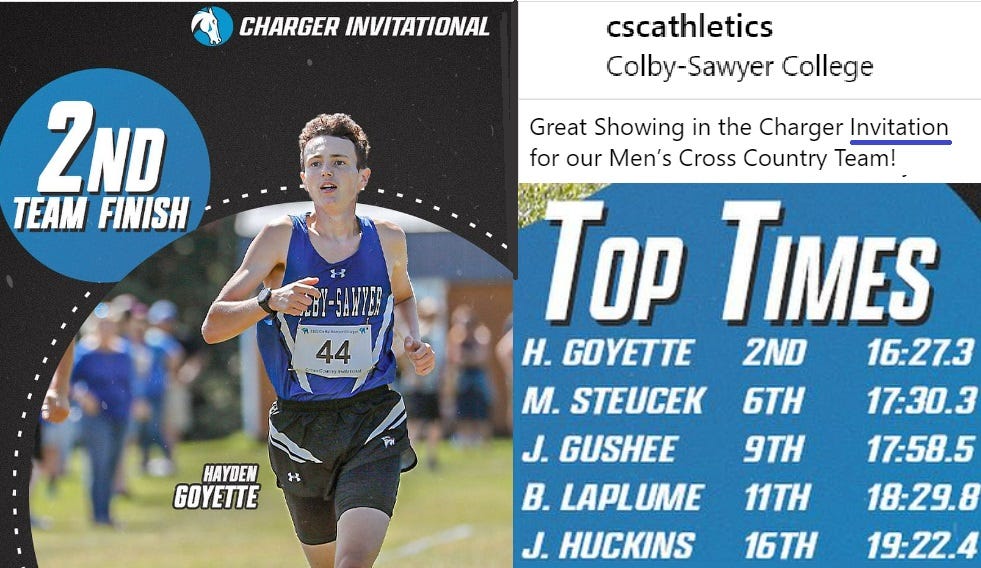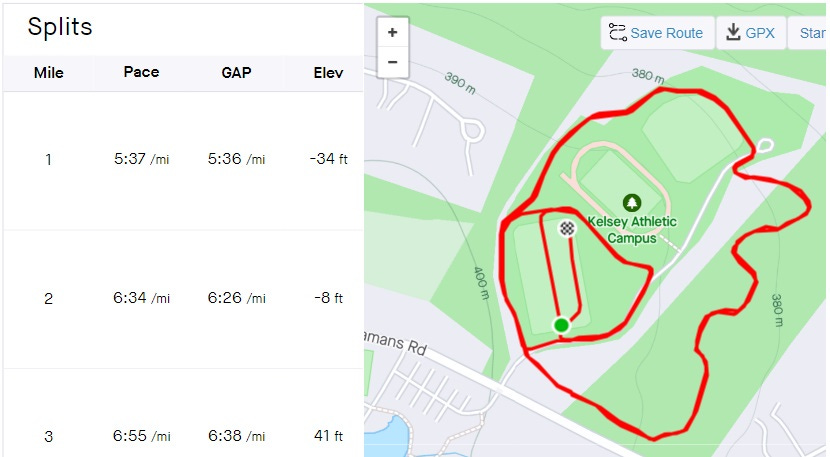"Everyone's watches lost GPS in the woods so our paces were all off"
Taking a moment to appreciate how technology has changed even the language of the most basic athletic narrative: the first-person race report
My nephew Hayden, a junior in college whose exploits occasionally infiltrate these narratives to buffer their ever-increasing acidity, came into the 2023 cross-country season off an almost surreal spring that saw him break two minutes in the 800 meters and win a conference title in that event. This kid, as many will recall with head-shaking bedazzlement and hoarse cries of “Holy shit!,” was a 2:23 high-school performer.
But Hayden also came into this fall after an abbreviated 2022 cross-country season that saw him sidelined mid-campaign with anemia. Despite his springtime shine and more recently proving his fitness with a 16:19 5K at a road race in Manchester on August 10, he has been understandably hungry to decisively bury his results from last autumn under a methodically assembled display of excellence.
Hayden’s season opener was a week ago on his 5K home course. It went well.
The text I got from Hayden after his race contained this:
Thanks, Uncle Kevin! Today was an interesting and exciting race
Everyone's watches lost GPS in the woods so our paces were all off, but it probably made best for a blind run that way
We apparently opened sub-5 downhill which is very refreshing and continued with what we had throughout the tank
I’m trying to figure out how much sense I would have made of this when I was a junior in college myself, in the fall of 1990, apart from wondering why this person’s period key evidently wasn’t working. I had known since I was twelve or so that there were satellites orbiting the planet courtesy of the ever-defense-minded U.S. Department of Defense as well as a smattering of benignly watchful actors from abroad. But it happened to be in the summer of 1990 that I was formally introduced to the term “Global Positioning System.”
Anticipating a future career as a medical officer, I spent six weeks of that summer at Fort Knox at R.O.T.C.’s Basic “Camp Challenge,” essentially like any other introduction to the Army for mostly military-naive personnel except that this batch of beaming, crew-cutted fuckups was required to be in college. In addition to shooting an M-16 at fake Russkies and M-60 tracer-rounds at the remains of tanks, getting to see the inside of an AC-130 gunship (these are improbably huge), and having my eyes opened to how many dumb people from Texas alone were enrolled in apparently accredited colleges, I had to complete a land-navigation training exercise whose setup relied on the use of hand-held GPS devices that looked a little like portable radios. No watches then, even for military types. Think Moore’s law.
(For this work, I received an award and a sum of around six hundred dollars. That beat working at a video-rental store all summer.)
It would be another ten years before the Department of Defense would “descramble” the signals transmitted to and from the expanding celestial grid of GPS satellites. Shortly before President Bill Clinton left office amid stained dresses and the initial transformation of the Democratic Party into neocon grubsuckers, the Chief Executive signed an order that took effect on May 1, 2000 that paved the way for people in 2023 to have no fucking idea where they are, where they’re going, or where they’ve been unless holding a smartphone or driving a car with a built-in satellite navigation system. It also paved the way for a demoralized company called Strava to monetize narcissism to the tune of who knows how many millions of dollars and counting. Meanwhile, the American government pretends it launched all that hardware up there as “a global public service.”
Some snark aside, GPS watches, on balance, are obviously a great thing for runners and running, even when they don’t come with all the biometric bullshit about calories and sleep and stress and flatulence. But even after this review, I’m not sure just how I would have read a race report like Hayden’s in 1990 knowing it was from the future (and somehow not focusing on the enormity of this aspect of the analysis).
Had I seen the words in this text in high school, I wouldn’t have known what “GPS” was. But even without the benefit of my R.O.T.C. experience, I would have determined that the author was wearing something on his wrist that allowed him to gauge his pace on the fly. I think I would have concluded in the late 1980s that this could only be reliably done using satellites, and by the time I was a college junior I knew it could easily be done (the physics, if not the logistics) using satellites.
The part that might have blown me away is athletes being allowed to wear these devices during races. When I was in high school in New Hampshire, we were not allowed to wear watches at all, at least not at championship meets where there was always one asshole-stickler coach (and usually just the one, known to all the rest and all but six of the kids, too) who would find a cheeseball reason to submit other teams’ runners for cancellation from the meet results. And these watches didn’t tell you shiddlydit other than elapsed time—you might was well have been running with a cuckoo clock on your shoulder (also an obscure but handy basis for disqualifications and shaming).
Hayden’s watch may have dropped a deuce on his data-collection from last Friday, but in his anemic 18:45 on the same course one year ago, the GPS worked fine. (As a healthy freshman, Hayden barely broke 20:00 here.) It looks like a quick start is somewhat baked into the Colby-Sawyer College course’s terrain, but if Hayden was running sub-5:00 pace for the first mile, it means he could have run at least fifteen seconds faster with a slower start and if not stranded by himself for most of the race.
Hayden’s next race is an 8K on September 16 at the U. Mass.-Dartmouth Invitational, which is far closer to Martha’s Vineyard than to Dartmouth College. Although he is destined to excel most at the middle track distances, he’s ready to threaten or break 27:00 on a fair, dry course, which in his conference would be a big deal. It would also be getting close to how fast I ran for 8K in college on turf, or anywhere, and I was a distance guy all along.



